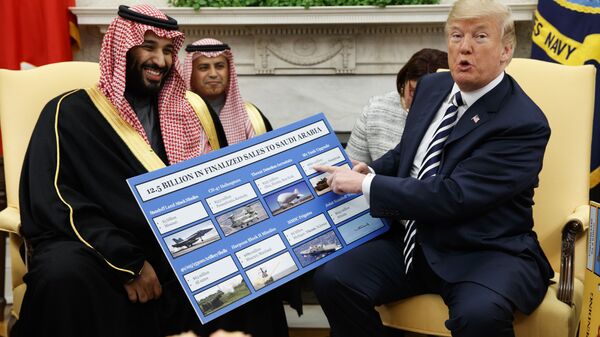One article of spending in Saudi Arabia’s budget hasn’t suffered much as a result of the recent global economic calamity – defence spending.
In fact, according to Western defence contractors speaking to the Financial Times, business is booming.
“I was fully expecting there to be a cut, but the information from very senior levels and princes is ‘no, we’re not going to do it. In fact, don’t come and ask me if your programme is going to slip, keep working hard at it, because we are carrying ahead,’” one anonymous Gulf-based Western arms industry executive told the newspaper.
In mid-May, two days after the kingdom introduced the austerity-related cuts to fill the $9 billion hole in its budget, Boeing was awarded a $2.6 billion contract for the purchase of over 1,000 new surface-to-air and anti-ship missiles.
Lockheed Martin Middle East division chief Robert Harward said that none of the company’s regional clients had “backed off” on defense spending in recent weeks, noting that expects Riyadh and others to “continue with their procurement” because “regional threats are not receding and are more unpredictable than ever.”
A Saudi finance ministry spokesperson confirmed that Riyadh plans to continue supporting its military needs, sparing “no resources to defend our people and our territory.”
According to the Stockholm International Peace Research Institute, Saudi Arabia spent some $61.9 billion on defence, or 8 percent of its GDP, in 2019, placing it fifth behind the US, China, India and Russia among the world’s top spenders. Unlike these other countries, the kingdom depends on foreign imports for the vast majority of its arms purchases, with the US and the UK providing for most of its needs.
Who were the top 10 military spenders in 2019?
— SIPRI (@SIPRIorg) April 27, 2020
1) USA🇺🇸
2) China🇨🇳
3) India🇮🇳
4) Russia🇷🇺
5) Saudi Arabia🇸🇦
6) France🇫🇷
7) Germany🇩🇪
8) UK🇬🇧
9) Japan🇯🇵
10) South Korea🇰🇷
Together they spent $1430 billion, accounting for 75% of global military spending ➡️ https://t.co/ZSlbz8iP16 pic.twitter.com/MsiRUPXFAj
Riyadh is thought to have spent tens of billions of dollars on the war in Yemen, where it has been trying to restore ousted Yemeni president Abdrabbuh Mansur Hadi to power since 2015. Hadi fled to Saudi Arabia in 2014 after the Houthi militia group took control of Sanaa and spread across much of the country.
Saudi Arabia and a coalition of mostly Gulf state allies began a campaign in Yemen in March 2015 with US and UK logistical support, but the alliance has so far proven unable to dislodge the Houthis. Additionally, Saudi air defences have had to deal with Houthi missile and drone attacks on cities, military bases, airports, and other infrastructure in Saudi Arabia itself. Last year, the group launched a massed drone attack on a pair of Saudi oil refineries, temporarily knocking out about half of the kingdom’s oil output.

